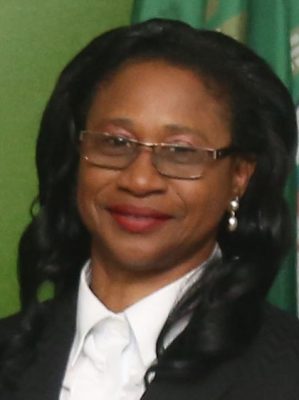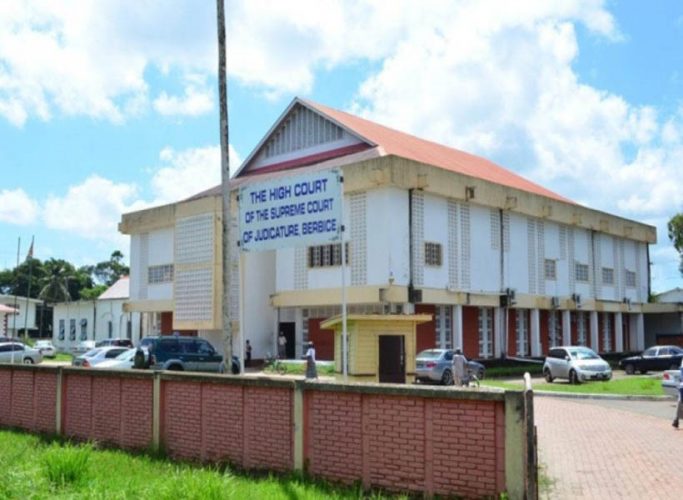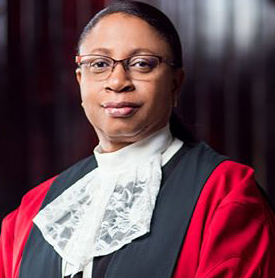Since the establishment of the specialised courts, sexual offence cases are being addressed more speedily by the judiciary and it has been found that complainants are also more likely to follow through with their complaints.
These improvement are being credited directly to the specialist nature of the courts, which are designed to give sexual offence cases the specialised treatment they require.
This was revealed by the two women who sit at the helm of the judiciary, acting Chancellor Yonette Cummings-Edwards and acting Chief Justice Roxane George-Wiltshire SC, in their addresses to commemorate the third anniversary of the first Sexual Offences Court, located at the Georgetown High Court.

The court was stablished on November 13th, 2017 as the first ever in the Caribbean. Courts were also launched in the counties of Berbice and Essequibo at the New Amsterdam and Suddie High Courts on May 5th and September 16th, 2019, respectively.
Through its Protocol and Communications Department, the Supreme Court of the Judicature reported that a total of 131 cases have been tried at the three courts to date. “Convictions totaled 61, with 40 not guilty verdicts, 12 guilty pleas, 47 guilty verdicts, 18 hung juries, 18 acquittals and 4 aborted matters. In some cases, the accused appeared before the court indicted for more than one counts of the offence, thus having a conviction for a count or counts and or an acquittal or acquittals for the other,” the Department said.

It went on to add that sentences for such convictions ranged from a minimum sentence of four years to the maximum of life imprisonment.
The offences for which trials were conducted included rape (34 cases), rape of a child under 16 years (56), sexual activity with a child family member (35) and carnal knowledge (4). The minimum length of a trial was one day and the maximum, eight days.
The ages of the survivors range from 1 year old to 77, while females comprise the majority, accounting for 122 or 92%, with male survivors numbering nine or 8%.
The Department shared, too, that the Sexual Offences Court in Georgetown has seen the bulk of these cases, followed by Berbice and then Essequibo.
According to the Protocol and Communications Department, the idea of having sexual offences courts in all three counties was birthed because of the significant increase in such cases being heard and a realisation of the need to have such sensitive matters resolved in a safe atmosphere for survivors, while ensuring speedy but fair trials.
In 2010, the Sexual Offences Act was enacted with an aim to reform and consolidate the laws relating to sexual offences and to provide for related matters. The legislation also provided for the establishment of a Sexual Offences Court that would eventually see the landmark launch of the first court in the county of Demerara back in 2017.
Chancellor Cummings-Edwards described the law which brought the court into force as being “perhaps the most outward looking and progressive of all the legislative measures” aimed at reforms in dispensing with sexual offence cases—catering for the needs of both survivors and defendants while allowing for special measures in the courtroom for witnesses to testify.
In her remarks commemorating the third anniversary of the court in Demerara, Chief Justice George-Wiltshire said it is sad that sexual violence continues to be a scourge in society, but added that the establishment of the specialised court fosters an increased focus on addressing this form of gender-based violence in a more holistic way.
Against this background, she said apart from the need to implement the court, the judiciary realised that it needed to be more responsive to the concerns raised by society about the conduct of sexual offences cases. As a result, not only was the court established but it was designed as a “modern, survivor-friendly” one, outfitted with a recording system for the speedy production of transcripts of the court proceedings, which allows for cases to be completed in a timely manner.
In addition, she said that video screens or monitors in the court permit trials to be conducted via video link whether from a location outside the court or from the
special measures room that is located at the court.
Justice George-Wiltshire said, too, that judges are also required to give special directions to the jury so as to allow them to understand that they are not to consider gender stereotypical myths when they assess the survivors and the evidence in a case.
These and other special measures, the Chief Justice said, are meant to protect survivors by reducing re-victimization and permitting them to give the best evidence they could in an environment that encourages them to testify about what is a most traumatic experience.
The chief judge said that a supportive environment for survivors is necessary to ensure that their interactions with the justice system are less traumatic even as she noted that governmental agencies, such as the Probation Services and the Childcare and Protection Agency of the Ministry of Human Services, and non-governmental organisations, such as Red Thread, Help and Shelter, Blossom Inc and ChildLink provide support to survivors through forensic interviews, counselling and attending court with them.
Chancellor Cummings-Edwards pointed out in her address that among the modern amenities of the sexual offences courts are screens for vulnerable and intimidated witnesses to prevent them from seeing the accused while testifying, though the witness must however be visible to the judge, jury and defence counsel.
She said, too, that there is also the use of anatomically correct dolls for taking evidence from children who may have difficulty verbalising the details of their assault as well as examination of witnesses through a sworn intermediary.
The intermediary is intended to assist the witness to give his or her evidence and is also allowed to explain questions or answers so far as is necessary to enable the witness to be understood.
Enhanced
Director of Public Prosecutions (DPP) Shalimar Ali-Hack, SC in a statement on the observance of the third anniversary said that the Sexual Offences Court has enhanced criminal justice by facilitating the disposal of more sexual offence cases than were ever disposed of during an assizes prior to its launch.
She said that more persons charged are having their trials conducted in a timely manner, thus bringing some satisfaction that the court system is working.
The DPP said that with the introduction of the Sexual Offences Court, no longer are cases being left on the list for years without trial.
She admitted that this was unfair to both the accused and the complainant as the former would have the charge looming over him coupled with the uncertainty of when he will have a trial; and the complainant on the other hand would have suffered the tragedy of being raped and not having a trial to give some relief in the form of justice being served through the trial.
In addition she said that the complainant would also experience the uncertainty of not knowing when the trial would be called. Some complainants, she said, lost interest in their case because a trial was not being heard in a timely manner and they opted not to proceed.
The Department quoted Justice Simone Morris-Ramlall, one of the judges who preside in the Sexual Offences Court, as saying “the setting and protocols facilitate [the] delivery of testimony in an environment that maintains the dignity and privacy of the complainant with safeguards to guarantee the accused a fair trial…”
In a message on the anniversary of the court, UNICEF representative Irfan Akhtar said that UNICEF Guyana is pleased to work with the judiciary while stating that access to justice through specialised courts like the sexual offences courts, the Children’s Court and the Family Court is essential to strengthening the justice system, child protection and social welfare for all children and families.
Akhtar said that UNICEF remains a committed partner for the prevention and response to violence.
The Sexual Offences courts were realised through the support and collaboration of UNICEF, the Ministry of Social Protection, The Jurist Project and other stakeholders in the criminal justice system.






